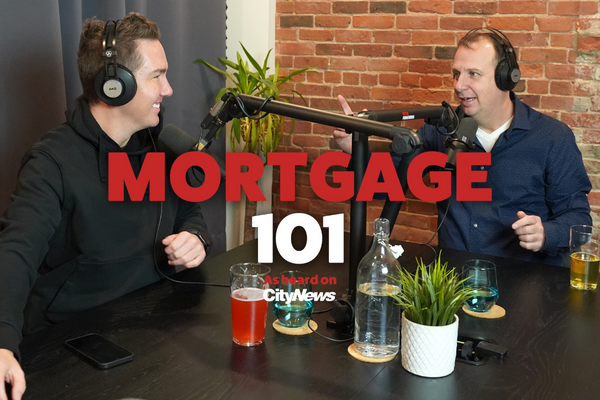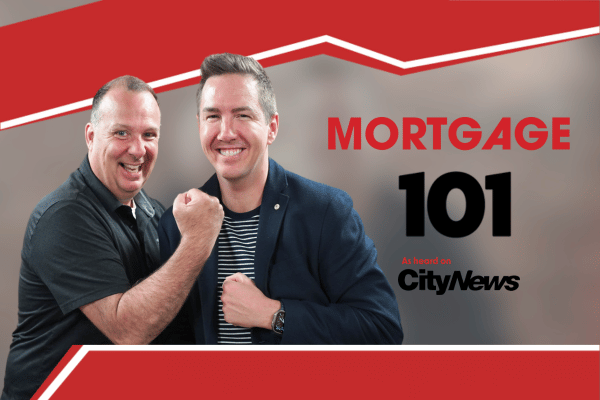In a brand new edition of Mortgage 101 live from CityNews, Clinton Wilkins and Todd Veinotte discuss the spring real estate market, finding the right lender for you, and what's happening with today's property taxes. They also discuss learning about fixed vs variable rates.

Mortgage 101 – Be smart with refinancing | Feb 27, 2023
So you’ve decided to refinance your home. What next? Clinton Wilkins and Todd Veinotte discuss the process of refinancing, what to expect and how to manage investing back into your home.
Todd Veinotte 00:05
All right, so we’re talking about loving your home. And obviously we’re talking about refinancing in order to love your home even more. Right? Well, exactly.
Clinton Wilkins 00:11
Well exactly, because you know, we heard from our realtor friend here earlier in the show that maybe improving your home before you sell it is a good idea. I personally think improving your home before you sell it is a great idea. But why don’t you enjoy your home? Yeah, you know, not everyone loves their home, I certainly get that. Sometimes the home doesn’t work for them. Sometimes it’s the location, sometimes it might be finishes, there’s a bunch of reasons maybe why people don’t love their home. But maybe there’s a way you can love your home more. You know what they say? It’s location, location, location. And then we say, buy the worst house in the best location. Because you can’t change the location, you can really change almost everything else about your home.
Todd Veinotte 00:52
If you have the money.
Clinton Wilkins 00:53
Exactly.
Todd Veinotte 00:54
Yeah. So let’s talk about that.
The refinancing process
Clinton Wilkins 00:55
So the way refinance works, and I’ll give you a little bit of nuts and bolts, is you can finance up to 80% of the market value of the home. Luckily, if you bought a house prior to, you know, 2020 and 2019, or earlier, you did well, you did pretty well. And typically those people have quite a bit of equity in their homes. And what you can do is you can finance up to 80% of the market value less how much you owe on any secured debt. So that’d be might be mortgage or home equity line of credit. And then the proceeds from that equity could be used maybe for the improvements, some people are choosing to use that equity to maybe pay down some debt. But obviously, you usually will love your home more if you improve it. So you can certainly pull that equity out. And typically what we tell people, when you borrow those funds from your home, and if you’re going to put the money into your house, I think in many cases, you will double down on maybe your investment. So let’s say for example, you put $50,000 in renovations in your home room, oftentimes you’ll increase the value of the home between 50 and $100,000. And in some cases more I think it depends really, what type of renovations you do.
Todd Veinotte 01:59
So what is the process? Let’s let’s go through the entire process. The mechanics of it, because it’s very important that people understand its, you don’t just walk into Clinton Wilkins and say, I want $50,000.
Clinton Wilkins 02:10
Yeah. So the way that it starts is we do an application and we do an application, it’s the same application, if you were going to buy a home, we asked your income, your assets, your credit, all your personal information, and we get the supporting documents. And then we submit the file for approval. And that might be to the existing lender that might be to the lender that you have your mortgage with now, or maybe we’re going to go to a different lender maybe depends on like, where we have our best relationships at the time, it might depend where the rates are, it might depend where we can actually get your file approved, depending on what your situation is. Once we have the approval, then we’ll know do we need an appraisal of the property. M ost times when we’re refinancing, we need to get an appraisal, because we need to know what the market value is on the property.
Todd Veinotte 02:52
It was a lender, that’s due diligence
Clinton Wilkins 02:53
The lender needs to know this. And the lenders luckily, in some cases have an automatic property valuation system. They leveraged the data from the Canadian Mortgage and Housing Corporation and a variety of other data sources. And sometimes they’re able to support the valuation internally. That doesn’t always happen. And I think right now because we’ve been in a raising kind of value environment and we’re doing more appraisals, let’s be honest. And whatever the appraisal –
Todd Veinotte 03:17
How much does the appraisal cost?
What to expect from an appraisal
Clinton Wilkins 03:19
I would say an appraisal costs, you know, 3,4,5,$600. Typically the borrower pays. And some lenders absolutely require the borrower to pay they don’t want let anyone else pay for it.
Todd Veinotte 03:29
Why?
Clinton Wilkins 03:31
Because it’s you know, they want to have undue influence over the appraisal. The bank owns the appraisal, though, Todd, the appraisal is not owned by the borrower. The borrower feels like well, I should have that appraisal, I pay for that appraisal. Well, you paid for it on behalf of the bank, the bank will own it, because the bank is going to rely on that appraisal to lend you money.
Todd Veinotte 03:49
Yeah. Here’s a question, let’s suggest that you want to go with another lender, that appraisal has been done. Is that a transferable appraisal?
Clinton Wilkins 03:58
If that lender relied on the appraisal, and you’ve done a deal? Nope, can’t show that appraisal, okay. If let’s say you had an approval, and we did an appraisal, and you’ve decided, hey, midstream, I want to actually use a different lender, or maybe that lender is decided they don’t want to do this transaction for you. In that case, in some cases it can be assigned or transferred. That’s the exception.That is not the norm. And typically, an appraiser cannot appraise the same property within six months for a different lender. So if you did an appraisal, and then you’re going to go to a different lender and you need a new appraisal, we typically have to go to a different appraiser, because that same appraiser can’t have kind of two reports that two different lenders are really relying upon. It’s a you know, it’s evaluation. Yes, there is some that opinion that is you know, taken from an appraisal, but they’re looking at the data. They’re looking at what has sold in the neighborhood, what maybe the square footage is going to be what the symbol similar sales are going to be and then it comes to a number and they average out these these properties with, you know, sometimes add backs or sometimes they take money away depending on what the features are the benefits, the style, the quality, location, all these things. And then it comes to a final value. What happens with that appraised value? Is that what the home should sell for in a balanced market or in a market that we’re even in right now. That’s what buyer should agree with the seller.People don’t always agree with the appraisal. Appraisal has a bit of opinion in there. It is a bit subjective. It is a bit subjective. And whatever we get in that appraisal, we can finance up to 80% of that market value.
Todd Veinotte 05:40
Right. So in other words, if if a house is appraised at $300,000, in value in equity, you can get 80% of this.
Clinton Wilkins 05:50
Yeah. So like, if the appraisal comes in at 300, we can do 80% or 300, which would be 242. Less than 240 would be how much you owe right now. Yeah. And then the net difference is what you could do for your improvements.
When to take equity out of a deal
Todd Veinotte 06:02
And at that time, would you reamortize over another 20, 25 years?
Clinton Wilkins 06:06
I think it depends on people’s situations Todd. I think a lot of people when they take equity out, they take a longer amortization, because let’s say, by virtue your payments gonna be higher.
Todd Veinotte 06:16
It’s gonna be higher. Yeah, exactly. So in order to absorb that shock, that’s the time to do that.
Clinton Wilkins 06:20
Yeah, I would say if you’re going to do a big financial transaction, and if you’re gonna pull some equity out, honestly, I look at everyone’s finances. Sometimes you don’t want to pull it the full 80%. But you have this like credit card debt, sometimes I’ll recommend, hey, I think you should take an extra 10, 20 $30,000 cleaned up on that debt. Have a better financial position. And in some cases, that will help maybe not take a longer amortization, because you’re making all these extra payments. Technically, you’d have more money to pay down the mortgage faster.
Todd Veinotte 06:48
The challenge is, obviously is not getting back into the cycle of debt, once you pay that off.
Clinton Wilkins 06:53
That’s really the key. And I think in some cases, we give the recommendations to lenders or lenders will deem that the borrower during the transaction has to close the credit accounts, in some cases. Or you could apply and get another piece of credit, let’s be honest. But what will happen is, typically lenders will allow the debt to be kept open, if you don’t need to pay the debt to make the numbers work to qualify, right. But if you have to pay the debt down to qualify, it’s, there’s a good chance you’re gonna have to close it.
Managing the cash out
Todd Veinotte 07:26
Yeah, yeah. So people, when the deal closes, you get a chunk of money in your bank account, and you can do with with whatever you want with that money, right?
Clinton Wilkins 07:34
Yeah. And when we do a refinance, to do the improvements, as long as we are using the current market value, you’re literally getting a cheque. Some lenders want to know that you’re not doing structural work to the house, because obviously that puts their security at risk. So you know, if there’s larger scale renovations going on, sometimes they ask a few more questions, but you don’t have to provide receipts, you just like get the money, you get the money and do what you need to manage it yourself, and you need to manage it well. Because if you’re getting a big lump sum of money, like let’s say you’re pulling out $100,000, you need to get a return on that investment, you need to improve that property. Because at the end of the day, you’re hoping to have even more equity than you had before the refiance. So there is some risk there on behalf of the lender, because they don’t know that, that you’re going to use that money in that way. And that’s why if there’s a large cash out, sometimes they ask some additional questions, but nothing that we can’t deal with nothing that we don’t deal with every day.
Todd Veinotte 08:25
Yeah. So I would say the vast, vast majority of times that this is done people use the money wisely and put the money into the house. Soemtimes it doesn’t happen I’m sure.
Clinton Wilkins 08:35
There’s always going to be the characters that don’t do what they’re saying what they say they’re going to do. Yeah, that always does happen,Todd. But I would say nine times out of ten, I would say even probably 99 times out of 100, people’s intentions are what they are.
Todd Veinotte 08:49
Yeah. And to and to your point earlier, you people do this if they’re going to sell in many times. But if you can do it, enjoy the home enjoy the upgrade, right?
Clinton Wilkins 09:01
Yeah, totally. Like, why are you improving the property for somebody else? It’s like a pain.
Be smart with your home improvements
Todd Veinotte 09:04
Yeah. That all said, it is an investment you are upgrading. And there is a time and a place for that also.
Clinton Wilkins 09:11
Of course, yeah. And you need to be able to afford it. Yeah, I think sometimes people have the pie dreams, or whatever dreams in the sky, of having this or that or, you know, doing a backyard renovation or doing a new kitchen and a bathroom that comes with an associated cost. You know, there’s a cost of borrowing, maybe you need to extend your amortization, which means you may pay your mortgage over a longer period of time, that comes with a cost. So it needs to be an educated decision on making this, you know, leap. Sometimes people come without maybe doing the research. Yeah, I know how much your kitchen costs. But you can do a kitchen for $20,000 or you can do a kitchen for $100,000. It depends really what you’re looking to do. So I think you kind of need to have a ballpark. And here’s the thing when you’re doing renovations, you need to have a fallback plan, you either need to have cash or credit for overruns. Because I can tell you, it certainly does happen. During our last radio show, we did some reels that were up on TikTok and Instagram. So if you’re following me, you can see these, Todd and I are are saying what we normally say. And I had someone comment, a listener from New Brunswick, that they built a new construction property 40% over budget. Four, zero. That is significant. And that can certainly put people in financial hardship if you don’t have the cash or credit to be able to cover, obviously, that override. And it’s probably good advice for people to consult with some contractors before they get into this. Right. Yeah, definitely. And I mean, in some cases, I think people are doing renovations themselves. You know, there’s people that work in the trades that maybe are handy and whatever. If you’re like a handyman special. I don’t think maybe doing the renovations yourself is always going to add the value to the property. During our last session, we had James Dwyer on and he said, you know, he’s seen people that put in a new kitchen. The house sells. Three weeks later the kitchen is in the dumpster. You don’t want to be that person, right? That’s a waste. That’s a waste of your money. That’s really wasting the buyers time. And I think in some cases, if you’re renovating to sell, you need to do the right things like make sure the envelope is good. Do that stuff. But then if you know, other stuff needs to be improved. Let the new buyer improve it.
Todd Veinotte 11:23
So the bottom line is, if you’re going into this and you feel as though this is something that you want to do get your ducks in a row, get your taxes, get your income, all of those ducks, that you’re gonna need all of that stuff
Clinton Wilkins 11:33
Know where your tax bill is. That’s the number one thing people don’t have. I can tell you, the people from 311 that get the calls are like, oh, is this one for Clinton? They probably know. They probably know. We get the tax bill on every single file. I’ll tell you why. That is a big piece of the underwriting for the lenders. And they always ask the lawyer to confirm the taxes. Guess what? Clinton’s already confirmed it, it will be a smooth closing, I know my files close on time. And I know that once I get a file approved, it is going to be a good approval, because I get a lot of documents up front. And you know, some lenders, some brokers just throw stuff at the wall and see if it’s gonna stick. I have a very high approval rating, and we get our mortgages funded, because we ask the questions.
Todd Veinotte 12:17
Yeah, absolutely. Alright, so we got another segment left. We’re going to talk about, we’re gonna be a little bit of maybe a buzzkill perhaps. But not necessarily, we’re gonna empower people, when they’re going into love relationships, and they want to cohabitate, and they want to go into these contracts together. We’re going to educate them with that, how’s that sound?.
Clinton Wilkins 12:35
Sounds great
Todd Veinotte 12:36
Mortgage 101. We’ll be right back.


